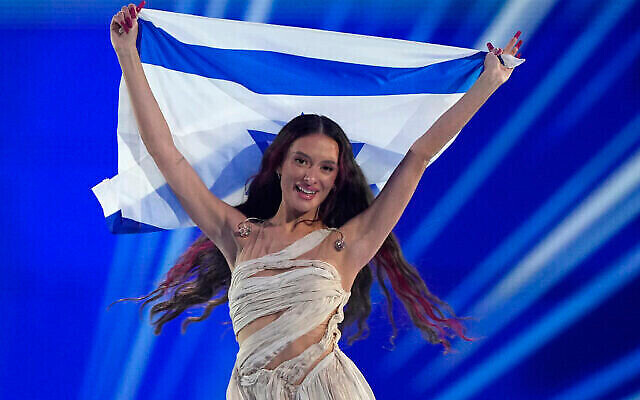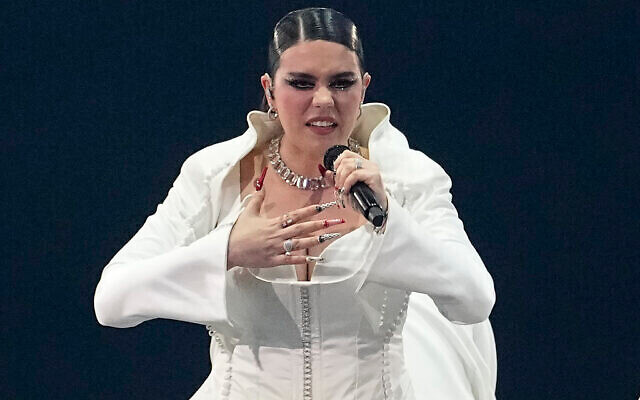Israel finishes 5th as Switzerland wins Eurovision in Malmo
Israel’s entry receives second-highest public vote after months of activists calling for it to be barred; Irish and Portuguese acts make small pro-Palestinian gestures on screen.

(The Times of Israel) Switzerland won this year’s Eurovision Song Contest in Malmo, Sweden, while Israel finished in fifth place overall in a competition that was engulfed by politics and controversy.
Israel, represented by Eden Golan singing “Hurricane,” received the second-highest tally in the public vote, but was only 12th in the jury vote, which led to its overall fifth-place finish, late on Saturday night. Israel got 323 points in the televote, trailing only Croatia, which received 337 and wound up in second place overall.
Golan did not get 12 points — the maximum possible — from any country’s jury, but received eight each from Norway, Cyprus and Germany; five from both Belgium and Estonia; four from Lithuania; three each from France, Malta, Moldova and Georgia; and two from Latvia.
Israel’s jury awarded 12 points to Luxembourg, 10 points to Germany and eight to Ukraine. Israel’s points were presented live by Maya Alkulumbre, who did not wear a yellow hostage pin on air despite being seen with it during preparation for the show.
According to Ynet, she was asked to remove it ahead of the broadcast by the Kan public broadcaster, which was seeking not to anger the European Broadcasting Union. Kan did not respond to a request for comment.
Loud boos could be heard during the broadcast when Alkulumbre appeared on screen, as well as when countries awarded points to Israel.

Boos during Golan’s performance were muted by anti-boo technology deployed by the EBU, which stages the contest each year.
Golan performed “Hurricane” flawlessly, shouted “thank you” to the crowd after she finished, and burst into tears after she exited the stage.
In a statement following the competition, Golan said that she was “so proud” of Israel’s fifth-place finish: “From the very first moment we had one goal, which was to make Israel’s strong voice heard in the world, and I know that we accomplished that goal in a big way.”
Golan added that amid all the intensity of the competition, “I don’t forget for one moment our hostages, and I dedicate my participation in the contest to them!”
Meanwhile, the Israeli-born singer for Luxembourg, Tali, who performed “Fighter,” wound up in 13th place overall, with the only top jury points coming from Israel.
While the live broadcast, seen annually by more than 150 million people around the world, went off smoothly, there were large protests against Israel outside the arena in Malmo, and small mostly under-the-radar protests inside the stadium.
Portugal’s Iolanda wore a dress in the opening “flag parade” designed by a Palestinian designer, and her nails were decorated with green, red, white and black colors, as well as a keffiyeh pattern — something she didn’t sport during the semifinal.

Ireland’s Bambie Thug — who was ordered by the EBU to remove pro-Palestinian messaging written on their face in an ancient Irish language — was seen in the green room while awaiting the results with a stuffed watermelon, which has become a prominent pro-Palestinian symbol.
Videos posted on social media from inside the stadium showed that boos could be heard when Golan appeared on stage in both the opening flag march and during her performance of “Hurricane,” although they were not heard in the live broadcast. Many Israeli flags could be seen waving in the audience throughout the close to four-hour live show.
Sweden’s winner last year, Loreen, reportedly said before the competition that she would refuse to hand the trophy to Golan if Israel won.
Intensified controversy
While this year’s Eurovision has been wrapped in controversy for months, the 24 hours preceding the grand final were particularly intense, with a number of incidents surrounding Israel’s participation. The representatives from both Finland and Norway who were supposed to be announcing their country’s jury votes backed out ahead of the show, saying they did not want to take part, and were replaced by other representatives.
Ireland’s Bambie Thug, who has been vocally pro-Palestinian and anti-Israel, complained to the EBU about supposed insults from the Kan commentators during their semifinal performance this week. And French contestant Slimane paused his dress rehearsal performance mid-song to call for peace: “We must be united by music, yes,” he said, a reference to the official Eurovision slogan, “but with love and peace. Everyone wants to sing their song but they want to be united by love and peace.”

In the most dramatic turn of events, the Netherlands’ contestant, Joost Klein, became the first competitor in history to be disqualified by the EBU after he was involved in a threatening incident with a Eurovision camerawoman on Friday. Though the EBU confirmed that the incident had nothing to do with Israel, many online commentators nevertheless blamed Israel for his disqualification, and railed against the EBU for allowing Israel to take part while barring the Netherlands, whose song had been a fan favorite.
Israel sent “Hurricane” to the competition after its first submission, “October Rain,” was disqualified by the EBU on charges that it was too political. Activists led a months-long campaign aimed at getting Israel barred from the competition, but organizers steadfastly refused to do so. Activists also tried unsuccessfully to get contestants to drop out of the contest to protest Israel’s inclusion, but none did.

Golan was largely confined to her hotel room for the weeks leading up to the show, skipping virtually all events surrounding the contest except for the live shows and dress rehearsals, due to a high threat level against her and the delegation. During the “turquoise carpet” event on Sunday evening, Golan and the Israeli delegation hosted a small Holocaust Remembrance Day gathering.
Switzerland, which has won the contest twice in the past, is slated to host the 2025 edition of the competition. Israel has won four times, most recently in 2018 with Netta Barzilai’s “Toy.”

comments